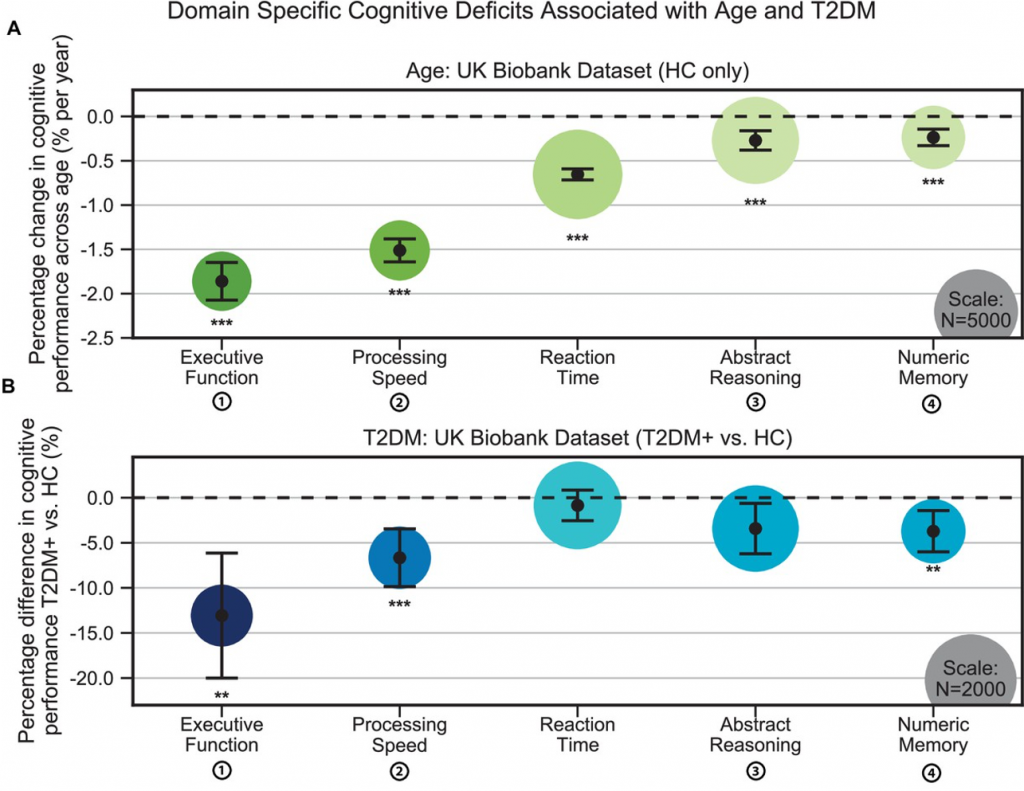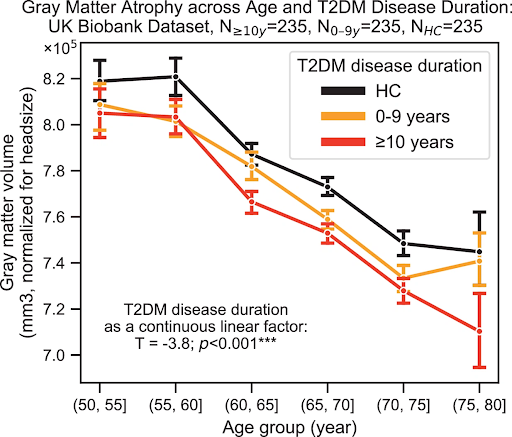Key Points:
- Age-related cognitive decline – progressive reduction in thinking capacity – is accelerated in type 2 patients.
- Neurodegeneration – brain deterioration – is accelerated by 26% in type 2 diabetes patients.
As we age, our brains progressively deteriorate, making it increasingly more difficult to think. Among other faculties, we lose our ability to focus, process new information, and remember new information. This cognitive decline is more severe in some individuals than others, in some cases leading to dementia. If that wasn’t enough of a problem, a new study published in eLife shows that type 2 diabetes can make this cognitive decline more severe and occur at an earlier age.
Borne out of a collaboration between Stony Brook University and Harvard Medical School, Antal and colleagues reveal that type 2 diabetes may accelerate brain aging. The East Coast scientists show that patients with type 2 diabetes have marked cognitive deficiencies, particularly in executive functioning and processing speed, likely due to increased brain atrophy (or wasting/shrinking of the brain). These changes occur with normal aging but happen earlier in diabetes patients, indicative of accelerated brain aging. These findings suggest that brain aging can be sped up by other age-related diseases like type 2 diabetes.
“The neurocognitive impact of T2DM [type 2 diabetes mellitus] suggests marked acceleration of normal brain aging. T2DM gray matter atrophy occurred approximately 26% ± 14% faster than seen with normal aging; disease duration was associated with increased neurodegeneration,” the researchers wrote.
Type 2 Diabetes Accelerates Brain Aging
Antal and colleagues examined over 4,000 individuals, including type 2 diabetes patients and healthy individuals over the age of 50 from the UK Biobank – a large-scale biomedical and research data repository. Healthy individuals without diabetes had a marked increase in age-related cognitive decline, as measured by executive function (controlling emotions, thoughts, etc.), processing speed, reaction time, abstract reasoning, and numeric memory. Compared to these healthy individuals, type 2 diabetes patients showed a further decrease in executive function, processing speed, and numeric memory. These findings indicate that cognitive decline is accelerated in type 2 diabetes patients.

Type 2 diabetes is caused by either insufficient insulin production – which regulates how cells take in sugar for energy – or by cells responding poorly to insulin, decreasing cellular sugar intake. Either way, this dysregulation of insulin leads to high blood sugar. It is possible that the metabolic disruptions caused by high blood sugar lead to brain cell death and neurodegeneration. The authors even suggest that such metabolic disruptions, which can lead to oxidative stress and inflammation, can be why aging occurs.
Antal and colleagues measured neurodegeneration/brain atrophy (loss of brain matter) from type 2 diabetes patients and healthy individuals as they aged. While healthy individuals had a 1% decrease in brain matter per year, diabetes patients had a 6.2% decrease per year. Additionally, the brains of patients living with diabetes for over ten years degenerated 26% faster than healthy individuals. These findings indicate that neurodegeneration is accelerated in type 2 diabetes patients.

The findings of Antal and colleagues suggest that brain atrophy may be a better marker for disease progression than blood sugar levels, changing the way diabetes is viewed and diagnosed. This could lead to earlier diagnosis and treatment. Potentially, early treatment may allay some of the severe neurological effects, given that the diminished sugar/energy availability inherent in diabetes may be leading to significant damage prior to formal diagnosis.
Can Accelerated Brain Aging be Prevented?
While stopping age-related cognitive decline and neurodegeneration may prove difficult with today’s current understanding of brain aging, it seems possible to stop the acceleration of brain aging caused by type 2 diabetes. In Antal and colleagues’ study, the common diabetes medication metformin did not have an effect on cognition or brain atrophy, so it doesn’t seem that such medications can prevent type 2 diabetes-induced accelerated brain aging. However, accelerated brain aging could be stopped or prevented by preventing type 2 diabetes. Diet and increased physical activity can help muscle cells utilize insulin and sugar more efficiently, while lack of exercise causes cells to lose insulin sensitivity. A recent clinical trial run by the National Institutes for Health (NIH) showed that a half-hour of walking or other low-intensity exercise daily, combined with a low-fat diet, reduced the risk of type 2 diabetes by 58%. Furthermore, working to control one’s weight, cholesterol, blood pressure, and blood sugar can help prevent complications even after a diabetes diagnosis.